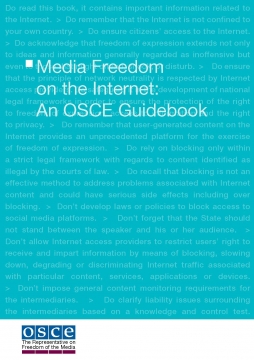 As the OSCE Representative on Freedom of Media, I believe that the rights afforded to producers and consumers of traditional media equally apply to new media platforms as well.
As the OSCE Representative on Freedom of Media, I believe that the rights afforded to producers and consumers of traditional media equally apply to new media platforms as well.
That is why my office, an independent institution that is part of the Organization for Security and Co-operation in Europe, will continue to monitor developments across the 57-state region of the international organisation to alert governments to the dangers of unnecessary and excessive regulation of this great, new electronic frontier.
As part of these monitoring activities, my office recently published Media freedom on the Internet – an OSCE guidebook, written by Law Professor Yaman Akdeniz of Istanbul Bilgi University. Akdeniz, one of three winners of the 2016 Columbia University Global Freedom of Expression Prize in the legal service category, was also the author of the online publication Freedom of Expression on the Internet, a study of legal provisions and practices related to freedom of expression, the free flow of information and media pluralism on the internet in the OSCE participating States.
His latest publication provides a concise overview and update of these issues. It also reviews OSCE media freedom commitments, Article 19 of the Universal Declaration of Human Rights, Article 19 of the International Covenant on Civil and Political Rights, Article 10 of the European Convention on Human Rights and case law of the European Court of Human Rights.
Too many OSCE participating states block, filter and shut down websites and social media platforms. These restrictive measures, of varying magnitude, have the overarching goal of suppressing free expression online.
To me, the human rights framework strengthening free expression on the internet is clear. Article 19 of the Universal Declaration of Human Rights says:
“Everyone has the right to freedom of opinion and expression; this right includes freedom to hold opinions without interference and to seek, receive and impart information and ideas through any media and regardless of frontiers.”
Indeed, this declaration, adopted in 1948, has withstood the test of time, providing a framework for the protection of expression on the internet, as well as print media or free speech.
And in 2012, with the adoption of the landmark Resolution 20/8, the “promotion, protection and enjoyment of human rights on the Internet,” the UN Human Rights Council confirmed that Article 19 of the Universal Declaration of Human Rights applies online in exactly the same way as it does to traditional media and speech.
So what’s the issue?
Governmental authorities, politicians, law enforcement officials and, yes, free expression campaigners still tend to frame the issue of internet regulation as a debate without modification, pitting one essential value against another. In the case as it is postulated today that means trading off civil rights for national security. And vice versa.
Confusing the situation further are the calls from those who claim that governments and their regulatory authorities have absolutely no right to interfere with the transmission of ideas across new media platforms.
Governments do have a crucial role to play when it comes to regulating the internet and guaranteeing its freedom. This responsibility extends to the protection of minors from harmful content, combating racism and inhibiting content inciting hatred or violence and even fighting cyber crime. Conduct that constitutes a crime in the real world does not deserve even a patina of protection simply because new technologies are employed in its development and transmission.
But governments must also ensure that all stakeholders, including civil society, are consulted and involved in these efforts ensure that regulations designed to ensure the safety of the internet also prioritise and safeguard free expression. To put it simply, the less regulation the better. And regulations need to result in limited disruption to the creation and distribution of ideas and opinions and only for clearly defined and defensible reasons.
Professor Akdeniz’s new treatise provides a list of helpful do’s and don’ts for policymakers engaged in legislative drafting and regulatory enforcement. They would be wise to pay heed to the recommendations.
The publication is available online at www.osce.org/fom/226526.




